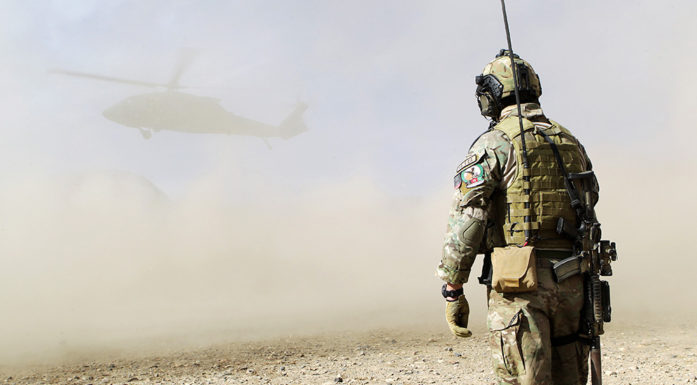Democracy doesn’t happen automatically
If the powerful players in international politics had known their history, they would have known that attempts to create democracies abroad usually end in disaster.
HISTORY: If you remove a dictator, a democracy is the natural form of governance that emerges.
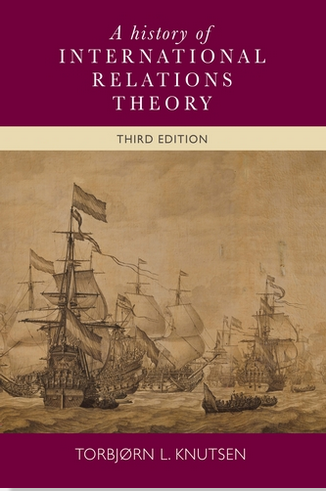
Torbjørn Knutsen’s book, “A History of International Relations Theory” has just been released in a newly updated version. Illustration: Manchester University Press
This is the line of thinking in the West, and this is what guided the West when it used military force to remove the Taliban, Saddam Hussein and Muammar Gaddafi from power. And this supposed truth notwithstanding, Afghanistan, Iraq and Libya all ended in chaos.
Torbjørn L. Knutsen is a professor of political science at NTNU and has just published an updated and expanded edition of his book A History of International Relations Theory, which is about our ideas on international politics from the Roman Empire to the present day. His message is clear: to understand political ideas, you have to understand history.
“Before we bombed Gaddafi, we should have thought about the results of similar regime changes. What happened when Julius Caesar was killed? That’s right- the Roman Empire plunged into civil war,” he says.
- You might also like: The potato disease that changed the world
Nations with historical conflicts
History books also tell us about South Korea and Japan, which became democratic through western intervention. What these two states had in common was that they were occupied. The territory was occupied and controlled by hundreds of thousands of soldiers. Meanwhile, they were threatened by communist neighbour states.
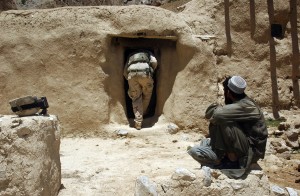
Afghanistan has never been a true country, and was never so united as it was under the repressive Taliban regime. The photo shows a house search of a suspected Taliban member. Photo: Thinkstock
Japan and South Korea had a choice between the West and communism—and chose the West. Democracy was indeed introduced from outside, but democratic ideas were solidified by “boots on the ground”, i.e. through a military presence, and strengthened by an external threat.
Knutsen says Afghanistan, Iraq and Libya are all different.
“These countries aren’t unified nations, but clan systems. Americans talk about Afghanistan as a failed state. But Afghanistan has never been a state. Afghanistan was never as united as when the Taliban were in power. When the Americans invaded the country to destroy the Taliban, they also destroyed this shaky new unified state. It was a terrible dilemma. Should they let the country remain a totalitarian state, but with some order, or should they introduce western rights and risk chaos?”
This dilemma has characterized our security policy relationships with many countries. Today this dilemma applies particularly to the Middle East and North Africa.
- You might also like: Medieval Norwegian realm comes under the microscope
Power conflicts and political games in Iraq
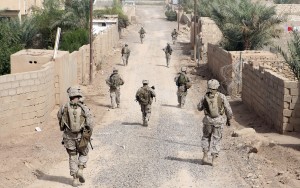
The US Marines in Iraq. But the conflict in the area is much older than Iraq as a country —and it has always been held in check by a dictatorial regime. Photo: Thinkstock
What we know as the Middle East was created from the remains of the Ottoman Empire after World War I. Iraq comprises three former Ottoman provinces, one Sunni, one Shiite and one Kurdish. The conflict between these three provinces are much older than the state of Iraq—and has always been held in check by a dictatorial regime.
Under Saddam Hussein, the Sunni minority held key positions of power and suppressed the Shiite majority. After the fall of Hussein, the Shiite majority won the 2005 election, but that still did not result in peace for Iraq.
Sunni Muslims from Hussein’s old regime established rebel groups to fight the US-backed Shiite regime that had marginalized them.
The Islamic state grew out of these groups— a coalition which has gradually established itself in Syria to fight against the Shiite regime there.
- You might also like: Norwegian iron helped build Iron Age Europe
Power conflicts and political games in Syria
So what can history tell us about the situation in Syria?
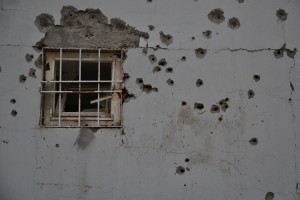
While the majority in Syria are Sunni Muslims, those in power are Shia. The photo is from Latakia. Photo: Thinkstock
Unlike Afghanistan, Iraq and Libya, Syria has a history as a nation. The country has traditionally been a dictatorship and Muslim by religion. But while the majority of Syria’s population are Sunni, those holding the power are Shiite. President Bashar al-Assad belongs to the Alawite sect, which is a minority within Shia Islam.
“Assad’s regime is a minority within the minority population and has everything to lose if democratic ideas take root in the country,” says Knutsen.
Syria is also situated in a region of violent upheaval, where strong political interests and several historic conflicts are intertwined. The regional superpower conflict between Sunni Saudi Arabia and Shiite Iran reflects the historic struggle between Sunni and Shia Muslims. In addition, the rivalry between the global superpowers is growing: the United States supports Saudi Arabia and Russia supports Iran.
“When the Soviet Union collapsed, Russia’s ties to a whole host of countries in the Middle East also ruptured. Syria was an exception. Today, Syria is Russia’s last foothold in the region. Russia is not going to sit idly by and allow President Assad to disappear,” says Knutsen.
The free market
Knutsen’s book on international politics also covers Western policy, including the emergence of a new political economy in the 1970s.
“It’s impossible to understand our own time without taking into account the neoliberal theories introduced by Margaret Thatcher and Ronald Reagan- which brought about a dramatic paradigm shift, both in national and international politics,” he says.
The West was in economic crisis in the 1970s. Interest rates were at 12-15 per cent. Then Thatcher and Reagan came along with something completely new: a firm belief that the market would regulate itself. This belief became popular and has continued to have great influence on political and economic policies. It has helped improve productivity in many countries, but it has also led to a highly unequal distribution of wealth in society.

Thatcher and Reagan came along with something completely new: a firm belief that the market would regulate itself. This belief became popular and has continued to have great influence on political and economic policies. Photo: Thinkstock
After 2000, these discrepancies became so great that the political system, which had been established in the interwar period, began to crack.
“The political landscape changed dramatically after 2010. In Europe, the populist parties grew at the expense of the old social democracy and the old right parties. In the United States, where differences often were even greater, the national political system fell apart,” says Knutsen.
In the US, Republicans fell prey to their own devices. For 25 years, right wing party candidates have both expressed contempt towards politicians and promised people more freedom.
Knutsen says, “Republican candidates have told their voters that they can’t rely on politicians in Washington. Once elected, they’ve sabotaged attempts to increase employment and reduce economic disparities, and paralysed the entire political system. They’ve shot themselves in the foot, and now the voters are showing their contempt for the Republican candidates running for office. Voters are fleeing to candidates who are outside the political establishment. Donald Trump’s series of victories is a consequence of 25 years of neoliberal rhetoric.”
Historical ideas repeat themselves
In the West, we are seeing the emergence of two political directions: combating inequality and a resistance to centralization and external interference. These are eternal themes in politics, says Knutsen.
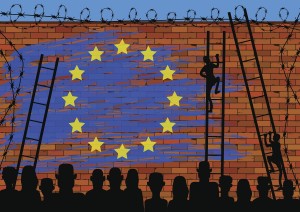
The Migration Period during the 4th century CE overwhelmed Rome’s institutions and was one of the reasons that the Roman Empire fell. Today, it’s the EU that is cracking under the pressure from the flood of refugees and migrants. Illustration: Thinkstock
“Before WWI, American politics were corrupt and chaotic. After World War II, a remarkable consensus characterized American politics. The fear of communism created unity around both domestic and foreign policy. Since the Cold War, American politics has in many ways reverted back to normal – contempt of politicians and social inequality. The two are connected – when politics become paralyzed, then money gets to decide. The Cold War was the exception, a parenthesis in American politics,” he says.
He warns against believing that innovations and development make historical experience obsolete.
“At the very end of World War II, Americans introduced the atomic bomb. With it a brand new area of research in international politics arose: strategic studies. The idea developed within this field that nuclear weapons brought the world into a new historical era with new international rules, where lessons from the past were irrelevant. This is a dangerous illusion,” says Knutsen.
He concludes his book in our time, as people flee a Middle East that is disintegrating. Human migration in the fourth century CE overwhelmed Rome’s institutions and was one of the reasons for the fall of the Roman Empire. Today it is the EU that is creaking at the joints due to migrations.
“History can tell us how things are interrelated. Kings and wars are still important. But it’s worth remembering that rulers are usually brought to power by rich and strong power coalitions in society, while wars often represent institutions on a collision course,” says Knutsen.


